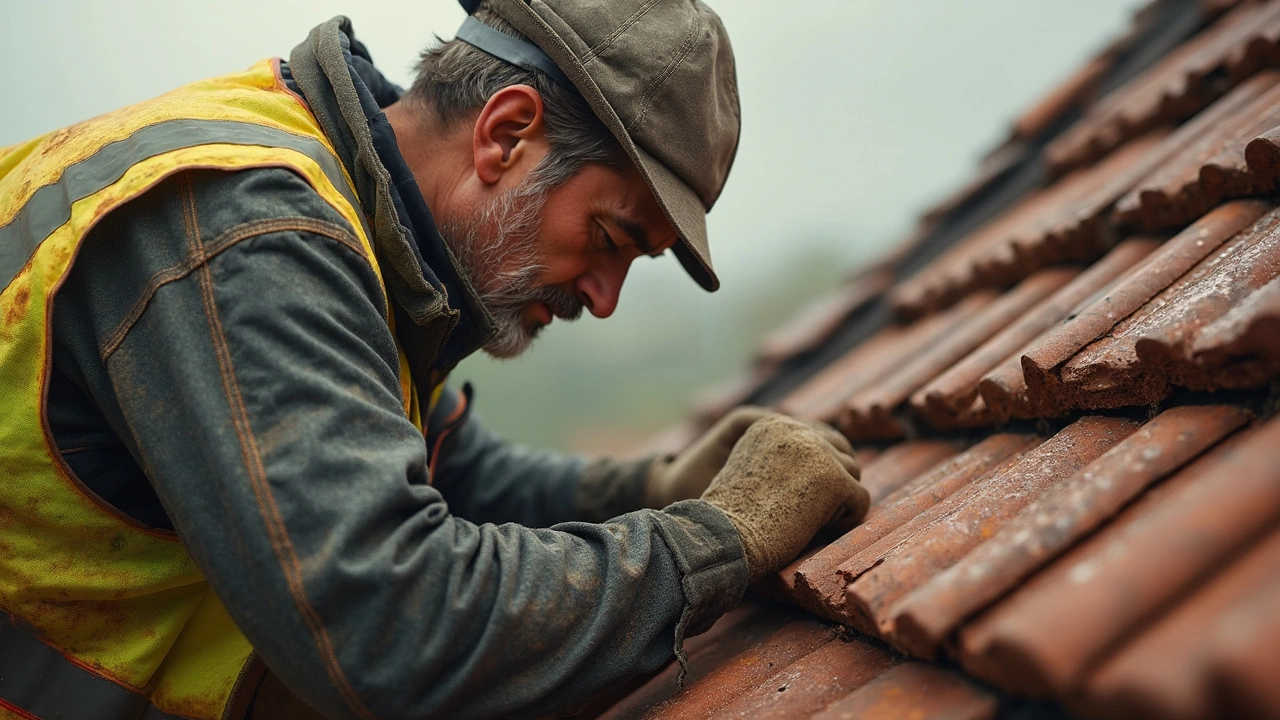So, you're wondering what the folks working on your roof are called? It's not just a hodgepodge of workers up there, but a crew with specific skills and titles. The most common term you've probably heard is 'roofer.' But this is more like an umbrella term for various roles involved in keeping your roof in tip-top shape.
Let's break it down a bit. Shinglers are the folks who you'll see laying down those flat, overlapping pieces we call shingles. If your roof looks more like it belongs in a European postcard, with beautiful tiles, then you'd need a roof tiler. And don't forget about the metal roofers—they're the wizards working with sleek metal sheets.
Each type requires a unique set of skills and tools. Whether it's for a repair or an entire new roof, knowing exactly what these roof workers do can save you time, money, and maybe a headache down the line when hiring someone for your project.
- Different Types of Roof Workers
- Essential Skills for Roofers
- Choosing the Right Roofer
- Tips for Hiring a Roofing Professional
Different Types of Roof Workers
When it comes to roofing, not every roof worker does the same job. Understanding the different roles can help you figure out who you might need for your project. Let’s take a closer look at the various types of workers you’ll find in this field.
First off, we have the shinglers. These folks specialize in applying and repairing shingles. They handle everything from asphalt shingles to the more high-end wood shakes. If your home has a shingle roof, these are the guys you’ll see balancing high up, nailing or stapling those shingles down to create a waterproof layer.
Next, we have roof tilers. They work with traditional roof tiles that you might find on Mediterranean or southwestern-style homes. This isn’t just an aesthetic choice; tiles are incredibly durable and can last for decades. Tilers have to be precise, as placing tiles incorrectly can lead to leaks or other damage.
There are also metal roofers. If your roof has sleek metal panels or you’re going for that modern look, you’ll likely need skilled metal workers. Metal roofing involves cutting and installing panels that have to fit perfectly together to protect your home from the elements.
- Shinglers specialize in shingles, using nails and staples.
- Roof tilers handle durable traditional tiles.
- Metal roofers work with sleek metal panels, ensuring perfect fitting.
Lastly, do not forget about flat roofers, especially in commercial buildings. They deal with materials like single-ply membranes and use a lot of materials like PVC and TPO, which are perfect for low-slope roofs.
Each type of worker plays an essential role in keeping our homes covered. Knowing whom to call saves not only time but also money, ensuring you get the best person for the job. So whether it’s a leak patch-up or a complete roof overhaul, knowing these distinctions can help you communicate better with the roofing crew you hire.
Essential Skills for Roofers
Alright, let's talk about what makes a roofer top-notch at their job. It's not just about slapping on some shingles and calling it a day. There's actually a whole set of skills these guys need to have.
First up, manual dexterity and physical strength are crucial. You know, all that climbing, kneeling, and heavy lifting can really take a toll, especially under the hot sun. A good roofer needs to be fit and nimble.
Then there's the stuff you might not immediately think of: problem-solving and attention to detail. A roofer can't just wing it. They need to spot issues before they become costly nightmares. Imagine finding a tiny hole, patching it up, and saving homeowners from a big, expensive leak.
Safety is a massive priority too. Roofers must be familiar with safety protocols to prevent falls or other accidents. This includes knowing how to properly set up ladders and scaffolding, and wearing the right gear.
And don't forget about technical know-how. They should understand different roofing materials and techniques. Whether it's roof tilers working with clay tiles or metal roofers handling sheets, knowing the specific requirements for each material is key.
Oh, and here's a little-known fact: soft skills matter. Good communication can make a project go much smoother. Roofers often communicate with homeowners and team members, so being able to explain what's happening and why is a big plus.
To wrap it up, here's a list of key skills and attributes:
- Physical fitness and balance
- Problem-solving ability
- Attention to detail
- Knowledge of roofing materials and methods
- Commitment to safety standards
- Effective communication
No matter what type of roofing job they’re dealing with, these skills ensure that they not only get the job done but get it done right.

Choosing the Right Roofer
Picking the best person for your roof job isn't as easy as it sounds, but it's super important. The right roof worker can mean the difference between a roof that lasts decades and one that doesn’t make it through a storm.
Start by checking if the roofer has the necessary licenses and insurance. Sounds basic, but you’d be surprised how many people skip this step. Licensing ensures that the roofing crew is up to speed with the industry's standards, while insurance means you won't be left with a huge bill if something goes wrong.
Then, dive into their experience. How many roofs have they fixed or installed? Ask for portfolios and recommendations. Experienced roof workers will gladly share their previous jobs and even get you in touch with past clients. Word of mouth is golden here.
Don't shy away from lots of questions. How do they approach problems during the job? What materials do they recommend? Are there alternatives in case something's out of my budget? A seasoned roofer will provide clear, honest answers and help you understand your choices better.
Another good move is to get multiple quotes. This doesn’t just give you a price range, it also helps you figure out which roofing jobs require higher investments and which ones don't. Keep an eye out for suspiciously low prices; these can mean corners are being cut.
Finally, consider checking online reviews and ratings. Websites like Better Business Bureau or Trustpilot can offer insights from homeowners like you who've gone through similar projects. Even a quick scroll through Yelp can reveal a lot about a company's professionalism and reliability.
Tips for Hiring a Roofing Professional
Finding the right person to work on your roof isn't just about grabbing the first name you see on a billboard. A bad job can mean leaks, damage, or even more cash down the drain. So, how do you nail down the right choice?
First off, check credentials. Make sure your roof workers are licensed and insured. Why? Licensing means they've shown they know their stuff and insurance protects you if anything goes wrong on the job. Ask to see proof; legit pros won't hesitate to show it.
Next, think about experience. While everyone starts somewhere, for bigger projects or issues like serious leaks, experience matters. A roofer with years under their belt will likely have seen and fixed enough problems to handle whatever you throw at them.
References can be your best friend. Ask for some and actually follow up. Talk to previous clients about their experience. Were they happy with the work? Was the job done on time? Satisfied customers usually mean you'll be happy too.
Don't forget to compare prices, but don't go straight for the cheapest option either. You want good value, sure, but you also need to get quality work. A middle-of-the-road quote often balances cost and quality well.
Insist on a detailed written quote. It should spell out the cost of materials, labor, and any extras. This way, you know exactly where your money is going, and it helps avoid any surprise fees. If the roofing jobs require extra work, a clear contract will be your safety net.
Finally, check for warranties. A solid roofing crew should provide guarantees for their work. Most roofing materials come with warranties, but a good contractor will offer a labor warranty too.
- Licensed and insured – always ask for proof.
- Seek out experienced professionals for serious issues.
- Follow up with references to gauge satisfaction.
- Balance cost with quality—get detailed quotes.
- Look for warranties to ensure peace of mind.
Picking the right roofing professional doesn't have to be a headache. Keep these tips in mind, and you'll have a sturdy roof over your head in no time.





